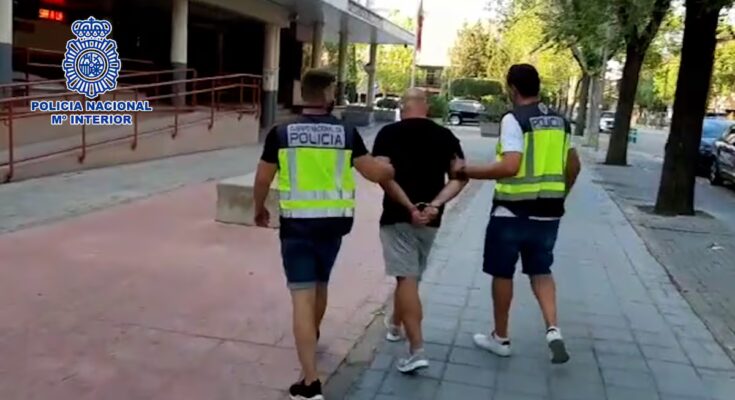Since this month, the Basque police have been offering new information on those arrested: the geographical area – not the nationality – from which they come. That is, it will be known whether the prisoner is Maghrebi, Latin American, European, Asian or sub-Saharan. This decision by the Basque government, in the hands of the PNV, makes the Ertzaintza the first police force in the country to provide this data.
In the midst of the effervescence of xenophobic and racist discourse, the decision is very complex. On the one hand, the far right uses the association between foreigners and citizens’ insecurity to instill fear towards immigrants and fuel hatred towards those who are different. On the other hand, disinformation is an anti-democratic tool and a favor to those who manipulate reality.
Taking a position requires knowledge and reflection, the resources of a mature society to decide in a democracy. Two experts, Jordi Mir Garcia AND Youssef M. Ouled, They reason according to their different points of view.
A tool against disinformation
Jordi Mir Garcia
The Spaniards must respect the law.” Can we imagine the leader of the opposition in the Congress of Deputies demanding that Spanish citizens respect the law? He says it in such a way as to make it clear that they do not respect it. When Alberto Núñez Feijóo presented the People’s Party’s proposals to tighten immigration policies at the end of September, he spoke in these terms: “Whoever comes must respect the law, otherwise they will be expelled”. Having heard, in several areas, it seems that migrants are criminals, no, but foreigners yes;
These are not new discussions, the identification of what is bad and undesirable with what is foreign and not shared is ancestral. But certainly the growth of political positions that have decided to make migrants a victim of our evils, who can be stigmatized, attacked, criminalized, has a lot to do with the period we are living in. Donald Trump, in the United States, won the elections by stating over and over again that migrants come to the country to commit crimes, rapes and murders; he even accused the immigrants of Springfield, Ohio, of eating domestic animals. The latter said this in the only electoral debate he had with Kamala Harris. Far from being a joke, it was a serious statement that caused serious clashes in the municipality to which it referred and elsewhere.
It is necessary to keep in mind the moment we live in when considering that a police force reports the nationality of people who commit crimes. What will happen when a crime committed by an immigrant is reported? It is not difficult to imagine that this real information could be used to generate discourses similar to those mentioned. If these conversations are already being generated without real data, what won’t happen when the data becomes available?
Indeed, there are immigrants who have arrived in Spain and commit crimes. In the same way that there are people of Spanish nationality, who commit themselves for life. In the prisons here, according to official data, 7 out of 10 inmates are Spanish and 3 out of 10 are foreigners. 9 out of 10 are men and 1 in 10 are women. We do not hear speeches that make man and criminal synonymous as in the case of immigrant and criminal. And that’s the real data.
Today’s debate on nationality information cannot ignore the context we find ourselves in and how it may impact making one decision or another. Considering the nationality to be reported now would have a lot to do with a double exercise. Transparency, on the one hand, since it is always necessary in a society that wants to be democratic. It is an exercise in dealing with misinformation, because a society in which misinformation has the ability to influence our decisions cannot be democratic. We cannot be free people if we are not informed.
Informing on nationality can help to try to advance, in this context, in the construction of a democratic society. But this will not be possible simply by making this information public. We will need to achieve this by generating knowledge that can counter and put an end to misinformation. Information on nationality is not sufficient. We will have to analyze and explain other realities that we do not have in the form of official data and which are more complex. For example, how do age, social class or material living conditions influence crime, the type of crime and the sentences received? But it will be necessary, from the beginning, to commit ourselves not to deceive by establishing a causal relationship, which does not exist, between the immigrant and the person committing the crime.
The data plays into the hands of racist discourse
Youssef M. Ouled
For years, social organizations and anti-racist groups have been asking that the various State Security Forces collect data broken down by race and ethnicity to counter a discriminatory and stigmatizing practice such as police checks based on racial profiling. That is, carrying out arrest and identification tasks, not so much on the basis of reasonable evidence, but motivated by ethnic-racial criteria.
This is a police action denounced by organizations and social groups coming from practically every part of the state, as evidenced by a poster promoted this year with the title Stop racism and not peoplewhich has almost 300 members. A complaint supported by international organizations such as the European Agency for Fundamental Rights, which for more than a decade has been alerting Spain to the negative impact of these discriminatory actions and asking that our country implement mechanisms to combat them. In fact, less than a month ago, the Council of Europe urged Spain to create a national register of police checks to prevent this discriminatory practice.
Documents that the Guarantor has recommended to the various local, regional and national police forces since 2014, embodied in forms to be filled in by officers during the exercise of their functions, which require not only to motivate police actions with objective evidence and information, but also necessarily to collect data disaggregated by race and ethnicity of the people stopped and identified. All with the aim of obtaining objective information on police work and measuring reported prejudices, but also allowing a better redistribution of police resources and mitigating the negative consequences that these actions have on the non-white population.
However, the response all these years to this request by the different police and security departments has been to ignore civil society, the affected population and the different organizations that request it.
In this scenario, the Security Department of the Basque Government announces in an unprecedented and exceptional way not only that it will inform on the geographical location of the prisoners, but it does so because reporting their nationality is stigmatizing, as if calling a person Maghrebi instead of Moroccan had a less criminalizing impact on a racial level. And it does so against the criteria of civil society and without any supranational body or organization having recommended it, but rather from the partisan need to compete for political ground with a right and an extreme right that have racial criminalization among their main strategies.
Talking about the geographic reach of prisoners in a context of structural racism in which, as we have underlined, the police act conditioned by prejudices, plays into the hands of those who associate race and crime. Especially if we are talking about people who have neither been tried nor tried. Two recent examples allow us to see the latter. One of these is the arrest of the influencer Noereddin El Yemlahy on charges of glorifying terrorism; The other is the arrest of Abarrafía H., accused of attempting to burn a minor in Las Palmas. Both were then acquitted by the courts, even though the criminalization of North Africans – a concept that the Basque government wants to use – had already taken place at all levels.
The timing of this decision by the Basque government is also not trivial. On a global scale, we are witnessing an ultra wave contaminating the political spectrum through a narrative that explicitly associates migration and crime. State administrations and institutions, far from playing into the hands of those who seek to deepen social gaps, inequalities and discrimination, should pay attention to an organized civil society that fights racism, for a better society.



